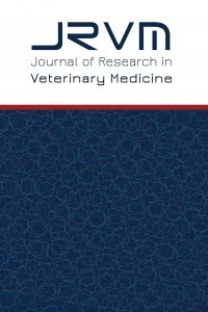SÜRDÜRÜLEBİLİR ULAŞIM PLANLAMASI İÇİN ŞEHİR İÇİ OTOBÜS HATLARINDA SEFER ÇİZELGELEME OPTİMİZASYONU
Şehir içi ulaşım sistemi, Otobüs sefer çizelgeleme, Optimizasyon, Çok amaçlı karar verme
Bus Trip Number Scheduling Optimization on Domestic Bus Lines For Sustainable Transportation Planning
Urban bus tranportation systems, Scheduling, Optimization, Multi Objective Decision Making,
___
- 1. Alp, S. (2008) Doğrusal hedef programlama yönteminin otobüsle kent içi toplu taşıma sisteminde kullanılması, İstanbul Ticaret Üniversitesi Fen Bilimleri Dergisi, 1 (13), 73-91
- 2. Baaj, M.H., Mahmassani, H.S. (1995) Hybrid route generation heuristic algorithm for the design of transit networks, Transportation Research Part C: Emerging Technologies, 3 (1), 31-50. doi.org/10.1016/0968-090X(94)00011-S
- 3. Banks, J.H. (1990) Optimal headways for multi-route transit systems, Journal of Advanced Transportation, 24, 127–154. doi.org/10.1002/atr.5670240205
- 4. Baysal, I. (2019) Şehir İçi Otobüs Seferlerinin Senkronizasyonu İçin Bir Model Önerisi: Denizli Örneği, Yüksek Lisans Tezi, Pamukkale Üniversitesi Fen Bilimleri Enstitüsü, Denizli
- 5. Berrebi, S.J., Watkins, K.E., Laval, J.A. (2015) A real-time bus dispatching policy to minimize passenger wait on a high frequency route, Transportation Research Part B, 81, 377-389. doi.org/10.1016/j.trb.2015.05.012
- 6. Ceder, A. (2002) Urban transit scheduling: framework, review, and examples, ASCE Journal of Urban Planning and Development, 128 (4), 225–244. doi.org/10.1061/(ASCE)0733-9488(2002)128:4(225)
- 7. Ceder, A. (2007) Public Transit and Operation. Theory, Modelling and Practice(1.Edition), UK: Butterworth-Heinemann
- 8. Ceylan, H., Özcan, T. (2018) Otobüs ağlarındaki sefer sıklıklarının armoni araştırması algoritması ile optimizasyonu: Mandl test ağı üzerine bir uygulama, Pamukkale Üniversitesi Mühendislik Bilimleri Dergisi, 24(6), 1107-1116
- 9. Chakroborty, P. (2017) Optimal routing and scheduling in transportation: using genetic algorithm to solve difficult optimization problems, Indian Institute of Technology Transportation Engineering, 33
- 10. Chang, S.C., Chung Y.C. (2005) From timetabling to train regulation—a new train operation model, Information and Software Technology, 47(9), 575-585. doi.org/10.1016/j.infsof.2004.10.008
- 11. Demirkollu, M. (2017) Hedef Programlama Yöntemi ile Otobüs Sefer Sayılarının Tespit Edilmesi, Yüksek Lisans Tezi, Pamukkale Üniversitesi Fen Bilimleri Enstitüsü, İnşaat Mühendisliği Anabilim Dalı, Denizli
- 12. Deri, A., Özuysal, M., Koçer, U., Çalışkanelli, S.P. (2011) Kentiçi otobüs işletiminde sefer çizelgeleme optimizasyonu, 9. Ulaştırma Kongresi Bildiriler Kitabı, 233-244
- 13. Deri, A. (2012) Akıllı Kart Verileri Kullanılarak Toplu Ulaşım Yolculuk Talebinin Belirlenmesi ve Sefer Çizelgeleme Optimizasyonu, Yüksek Lisans Tezi, Dokuz Eylül Üniversitesi Fen Bilimleri Enstitüsü, İnşaat Mühendisliği Anabilim Dalı, İzmir
- 14. Furth, P.G., Wilson, W.H.M. (1981) Setting frequencies on bus routes: Theory and practice, Transportation Research Record, 818, 1-7
- 15. Fournier, D. (2016) Metro Energy Optimization through Rescheduling: Mathematical Models and Heuristic Algorithm Compared to MILP and CMA-ES. Diss, Inria Saclay Ile de France
- 16. Huang, Z., Ren, G., Liu, H. (2013) Optimizing bus frequencies under uncertain demand: case study of the transit network in a developing city, Mathematical Problems in Engineering. doi: 10.1155/2013/375084, (2013)
- 17. Kalpakcı, A. (2013) Ara Toplu Taşıma Sistemlerinin Şehiriçi Otobüs Hatları ile Entegrasyonu, Yüksek Lisans Tezi, Dokuz Eylül Üniversitesi Fen Bilimleri Enstitüsü, İzmir.
- 18. Kittelson ve Assoc, Inc., Parsons Brinckerhoff, Inc., KFH Group, Inc., Texam A&M Transportation Institute, ve Arup (2013) , Transit Capacity and Quality of Service Manual, Transit Cooperative Highway Research Program (TCRP) Report 165, published by Transportation Research Board, Washington
- 19. Martínez, H., Mauttone, A., Urquhart, M.E. (2014) Frequency optimization in public transportation systems: Formulation and metaheuristic approach, European Journal of Operational Research, 236 (1), 27-36. doi.org/10.1016/j.ejor.2013.11.0079
- 20. Mesquita, M. (2008) Solving Public Transit Scheduling Problems, Universidade de Lisboa, Lizbon
- 21. Oudheusden, D.L., Zhu, William (1995) Trip frequency scheduling for bus route management in Bangkok, European Journal of Operational Research, 83, 439-451. doi.org/10.1016/0377-2217(94)00362-G9
- 22. Özcan, T. (2018) Kentiçi Toplu Taşıma Sistemlerinde Sefer Sıklığı Optimizasyonu, Yüksek Lisans Tezi, Pamukkale Üniversitesi Fen Bilimleri Enstitüsü, İnşaat Mühendisliği Anabilim Dalı, Denizli
- 23. Özkaya, M.E. (2006) Doğrusal Programlama Yaklaşımı ile Toplu Taşıma Sistemlerinin Planlanması ve Çizelgelenmesi, Yüksek Lisans Tezi, Hacettepe Üniversitesi Sosyal Bilimler Enstitüsü, Ankara
- 24. Ruisanchez, F., Dell’Olio, L., Ibeas, A. (2012) Design of a tabu search algorithm for assigning optimal bus sizes and frequencies in urban transport services, Journal of Advanced Transportation, 46, 366-377. doi.org/10.1002/atr.1195
- 25. Silman, L.A., Barzily, Z., Passy, U. (1974) Planning the route system for urban busses, Computers & Operations Research, 1(2), 201-211. doi.org/10.1016/0305-0548(74)90046-X
- 26. Sun C., Zhou W., Wang Y. (2008) Scheduling combination and headway optimization of bus rapid transit, Systems Engineering And Information Technology, 8(5), 61-67. https://doi.org/10.1016/S1570-6672(08)60039-2
- 27. Uludağ, N. (2010) Bulanık Optimizasyon ve Doğrusal Hedef Programlama Yaklaşımları ile Otobüs Hatlarının Modellenmesi, Doktora Tezi, Pamukkale Üniversitesi Fen Bilimleri Enstitüsü, İnşaat Mühendisliği Anabilim Dalı, Denizli
- 28. Vuchic, RV. (2005) Urban Transit: Operations, Planning and Economics, John Wiley and Sons Inc., New Jersey
- 29. Xiaofeng, M., Jianhua, G., Peng, C., Chaozhong, W. (2015) An inexact bus departure frequency model for traffic pollution contro, Transportation Information and Safety (ICTIS), 228-234.https://doi.org/10.1109/ICTIS.2015.7232195
- 30. Yua B., Zhongzhen Y., Suna X., Yaob B., Zenga Q., Jeppesenc E. (2011) Parallel genetic algorithm in bus route headway optimization, Applied Soft Computing, 11(8), 5081-5091. https://doi.org/10.1016/j.asoc.2011.05.051
- ISSN: 2148-4147
- Yayın Aralığı: Yılda 3 Sayı
- Başlangıç: 2002
- Yayıncı: BURSA ULUDAĞ ÜNİVERSİTESİ > MÜHENDİSLİK FAKÜLTESİ
Nanokompozitlerin Grafen ve Grafen Oksit ile Üretimi ve Karakterizasyonunun İncelenmesi
POLİMERLERİN ELEKTRİK İLETKENLİĞİ
Kübra KARABACAK, İbrahim Berk ÇAVUŞ, Onur KIYILI
Elektromekanik Eyletimli Bir Kanat Yükleme Cihazının Dinamik Modellemesi ve Denetimi
YEREL ÜÇLÜ DESEN İLE KULAK GÖRÜNTÜLERİNİN KİŞİ, YAŞ VE CİNSİYETE GÖRE SINIFLANDIRILMASI
Emrah AYDEMİR, Asaad Qais Shalal ABO SOOT
Melike YALILI KILIÇ, Sümeyye ADALI, Melek AYDIN
Halil İbrahim DOKUYUCU, Nurhan GÜRSEL ÖZMEN, Ömer CORA
Biyolojik Dokulara Vurgu ile Şişirilmiş Hiperelastik bir Tüpün Mekaniği
Ömer Faruk BÜYÜKKAYA, Ali Fethi OKYAR
SÜPERKRİTİK VE KLASİK ORTAMDA POLİESTER BOYAMANIN YAŞAM DÖNGÜSÜ ANALİZİ İLE DEĞERLENDİRİLMESİ
Semiha EREN, Neslihan KARADAĞ, İdil YİĞİT, Hüseyin Aksel EREN
